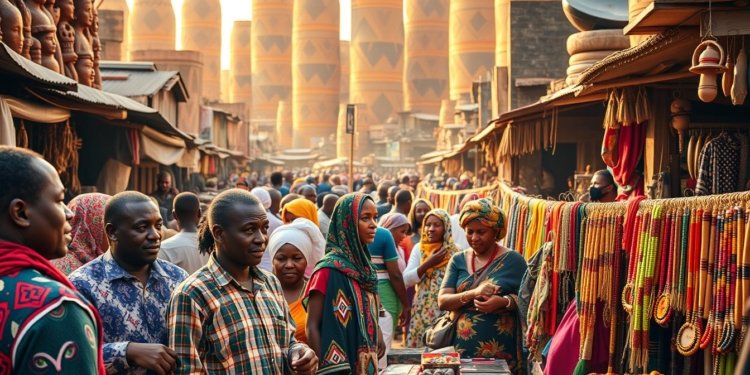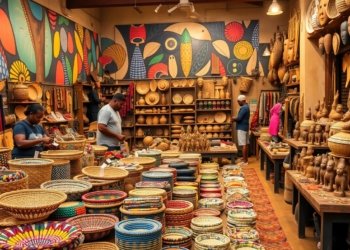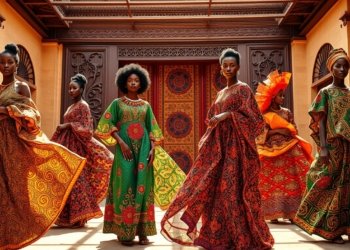Africa’s $3 trillion combined GDP is reshaping the world economy. Yet, many businesses overlook the power of its traditions in shaping success. Navin Ravindran, VP Sales at Aluzinc Asia, defines culture as “accepted norms, values, and rational behavior of groups.” This mindset drives how deals are made, partnerships form, and innovations thrive.
From Nigeria’s bustling markets to South Africa’s corporate hubs, local customs influence global strategies. Confucius once noted that habits define interactions—this rings true in African commerce. The CAGE Distance Framework highlights why understanding regional diversity is key for market entry.
Companies like Flutterwave and Standard Bank excel by blending global practices with local insights. Their client-centric models prove that cultural intelligence isn’t optional—it’s essential for growth. As borders blur, Africa’s unique dynamics offer lessons for every forward-thinking enterprise.
Key Takeaways
- Africa’s economic influence is growing, with a $3 trillion GDP.
- Cultural norms shape business behavior and decision-making.
- Historical and ethnic diversity create unique market dynamics.
- Firms like Flutterwave thrive by adapting to local customs.
- The CAGE Framework helps navigate cultural and geographic barriers.
Understanding Culture in a Global Business Context
Global commerce thrives when businesses grasp the invisible threads of cultural norms. These unwritten rules dictate everything from handshakes to contract signings. Ray Bradbury once noted, “Culture is the invisible fabric holding societies together.” In trade, this fabric determines success or failure.
Defining Culture: Norms, Values, and Practices
Culture blends material elements like clothing with intangible values like respect. Colonialism reshaped African business protocols, embedding foreign practices into local traditions. For example, Francophone regions favor French in negotiations, while Lusophone areas use Portuguese.
Edem Kodjo’s research highlights how post-colonial identity crises still influence deals today. A shared language matters—94.86% of African traders say it builds trust. Misreading social rituals, like gift-giving taboos, can sink partnerships.
Why Cultural Sensitivity Matters in International Business
McKinsey’s VUCA framework shows that customer-centric strategies win in volatile markets. Standard Bank operates in 19 countries, adapting to each region’s values. Their success proves that cookie-cutter approaches fail.
In one case, a misinterpreted greeting gesture derailed a $10M deal. Such moments reveal why understanding society’s nuances isn’t optional. As borders fade, cultural intelligence becomes the ultimate competitive edge.
The Rich Tapestry of African Cultural Diversity
From ancient trade routes to digital payments, diversity defines African commerce. The continent’s 2,000+ languages and ethnic traditions create unique business ecosystems. Richard Bell’s research shows how pre-colonial networks like the Trans-Saharan route still influence modern supply chains.
Historical Influences on African Identity
Yoruba kinship systems prioritize community trust, while Zulu warrior traditions emphasize hierarchy. These beliefs shape everything from team dynamics to contract negotiations. Colonialism layered French, English, and Portuguese onto local languages, creating hybrid administrative cultures.
Udeani’s globalization studies reveal how post-colonial identity struggles affect market entry. For example, Moroccan handshakes involve prolonged eye contact, unlike Kenya’s British-influenced brief grips. Misreading these cues can cost deals.
Regional Variations: Anglophone, Francophone, and Lusophone Africa
Mobile money adoption hits 55% in Francophone countries, outpacing Anglophone markets. This reflects trust in local telecoms over banks. The continent’s youth (63% under 25) drive further evolution, blending tech with tradition.
AfCFTA accelerates this shift by harmonizing regional differences. A Nigerian trader might use English for contracts but Yoruba for relationship-building. Such nuances prove that cultural intelligence unlocks growth.
The Impact of African Culture on Modern Business
Consumer loyalty in Africa often hinges on deeper ties than price or convenience. Traditions shape every transaction, from Lagos tech hubs to rural farming co-ops. Companies that ignore these nuances risk losing market share to culturally savvy competitors.
How Traditions Shape Consumer Behavior
Nigeria’s Ogun belief system, tied to honesty in craftsmanship, reduces corporate fraud in metalwork industries. Similarly, Daystar Power’s solar solutions succeed by honoring land reverence—installing panels only after ancestral blessings.
M-Pesa dominates mobile money because it understood unbanked populations. Its agent network mirrors village trust circles, not Western banking models. Retailers like Shoprite adjust inventory for Ramadan, when spending spikes post-sunset.
Cultural Nuances in Negotiation and Decision-Making
PwC found 73% of failed deals stem from misread communication styles. In Ghana, a 3-week consensus-building process outpaces rushed Western efficiency. Flutterwave localized its API for 900,000+ merchants by accepting tribal payment rituals.
Women-led co-ops under Heifer International saw 58% higher yields. Their model leverages communal farming traditions, proving that blending old and new drives growth. Time orientation varies too—long-term relationships often outweigh quick profits.
Business Practices Rooted in African Social Culture
Trust is the currency of commerce in many African markets, where handshakes often carry more weight than contracts. Here, success isn’t just about profit—it’s woven into kinship, shared values, and collective progress. Standard Bank’s 2017 study found that firms prioritizing these relationships saw 33% higher revenue growth.

The Role of Kinship and Community in Transactions
The Ubuntu philosophy—”I am because we are”—fuels supply chain partnerships. Ghana’s susu savings groups, for example, inspired microfinance models that prioritize collective trust over collateral.
Shoprite’s 40% sales surge in Nigeria came from local sourcing networks. Unlike Amazon’s one-click orders, African vendors often spend six months building trust before the first transaction.
Time Orientation: Short-Term vs. Long-Term Perspectives
Ethiopian coffee ceremonies ritualize deal-making, emphasizing patience. Dangote Group’s 20-year infrastructure bets contrast sharply with Wall Street’s quarterly targets.
For 68% of African businesses, community impact outweighs short-term gains. This time orientation reshapes global strategies, proving that endurance often trumps urgency.
Building Trust Through Relationship-Centric Approaches
Business deals in Africa often start with laughter, not spreadsheets. Trust is earned through shared experiences, not just signatures. Standard Bank’s research shows firms prioritizing these bonds see 33% higher revenue growth.
Socializing Before Business: The African Way
Nigerian “owambe” parties blend celebration with deal-making. In South Africa, a braai (BBQ) sets the stage for partnerships, while Moroccan mint tea rituals formalize respect. These traditions reflect the Ubuntu philosophy—“I am because we are.”
Avoiding small talk can cost opportunities. One firm lost a $5M deal by skipping pre-meeting tea in Algiers. Active listening and shared meals build bridges faster than PowerPoint pitches.
Etiquette and Communication Styles Across Regions
In Kenya, direct eye contact signals confidence. In Mali, it’s seen as defiance. Botswana’s gift-giving customs differ sharply from Egypt’s—knowing these nuances prevents missteps.
Title usage matters: 92% of professionals prefer honorifics like “Dr.” or “Chief.” ATEX’s digital platform maps such etiquette differences across 47 countries, smoothing cross-border trade.
Crossed legs during a Ghanaian chief meeting once sank a deal. Such moments prove that communication isn’t just verbal—it’s cultural.
Case Studies: Success Stories in African Markets
Three billion-dollar valuations prove cultural intelligence fuels business growth. Leading companies achieve this by blending global practices with local traditions. Their strategies reveal actionable insights for any firm targeting diverse economies.
Flutterwave: Bridging Payment Gaps with Cultural Intelligence
Flutterwave’s $3B valuation stems from understanding cash-based economies. Their “Paga” integration allows transactions without bank accounts—critical in Nigeria where 60% prefer cash.
Marketing in 12 local dialects boosted merchant adoption by 200%. This approach mirrors mobile money success in Francophone regions, where telecom trust outpaces banks.
Shoprite’s Localized Retail Strategy in Nigeria
With 78% customer retention, Shoprite dominates Nigeria’s market. Their jollof rice spice mix outsells imports 3:1 by honoring regional tastes.
Like Mali’s maize revolution, they source 40% of produce locally. This community-focused model drives growth while supporting farmers—a win-win strategy.
Dangote Cement’s 60% market share and Ecobank’s cross-border expansion further prove: cultural adaptation isn’t optional. It’s the blueprint for sustainable scale.
Cultural Intelligence (CQ) as a Business Imperative
Mastering cultural intelligence separates thriving businesses from those struggling in diverse markets. Firms with high CQ achieve 83% faster market penetration, according to McKinsey. This skill transforms how teams negotiate, innovate, and build trust.
The Three Pillars of CQ: Awareness, Adaptation, and Respect
Awareness starts with understanding local norms. SEKEM’s biodynamic farms in Egypt boosted yields by 120% by honoring traditional land stewardship. Tools like Hofstede’s 6D model reveal critical differences in power distance or individualism.
Adaptation means tailoring strategies. L’Oréal’s 54-shade foundation line for diverse skin tones captured neglected markets. Nestlé reformulated Maggi cubes for West African palates—proving product tweaks drive loyalty.
Respect closes deals. In Ghana, rushing into contracts without relationship-building risks failure. Bolt’s driver partnerships outperformed Uber by aligning with local earning customs.
How CQ Drives Market Entry and Expansion
AfCFTA’s competency certifications help firms navigate 54 unique markets. Heifer International’s model shows how respecting communal farming traditions increases yields by 58%.
McKinsey’s $1.5B Middle East banking loss underscores the cost of ignoring CQ. Meanwhile, Standard Bank’s client-centric approach in 19 countries proves that cultural fluency fuels sustainable growth.
Overcoming Barriers in Cross-Cultural Business
Breaking into African markets requires more than capital—it demands cultural fluency. With 1,000+ languages and varied administrative systems, global firms must adapt to thrive. Solutions like digital platforms and local partnerships turn obstacles into advantages.
Language Diversity and Communication Challenges
Pidgin English bridges 15 West African markets, while Swahili connects 5 East African nations. Data shows 94.86% trade boosts when partners share a lingua franca.
Ecobank’s chatbots handle 22 languages, reducing service gaps. DHL cut customs delays by 40% through document localization—proof that tailored communication drives efficiency.
Navigating Administrative and Geographic Distance
Satellite mapping solves last-mile distribution in remote areas. Afreximbank’s payment system simplifies cross-border transactions across 54 countries.
Local legal consultants slash costs by 68%. ATEX’s digital tools further bridge gaps, proving that the right strategies conquer distance.
From language apps to logistics tech, the world learns Africa’s lesson: cultural barriers yield to innovation.
The Role of Technology in Bridging Cultural Gaps
Technology is rewriting the rules of commerce across Africa, turning cultural barriers into bridges. Digital platforms now enable seamless transactions from Lagos to Nairobi, respecting local customs while driving growth. With 91% of Kenyans accessing the internet via mobile, solutions must adapt to regional behaviors.
Digital Solutions Facilitating Intra-African Trade
ATEX’s 47-country integration proves how tech unites fragmented markets. Their system processes payments in 22 languages, mirroring traditional trust-building through localizing interfaces. Similarly, M-Pesa handles $12.5B annually by replacing banks with mobile wallets—a nod to cash-based traditions.
Twiga Foods uses AI to predict Nairobi’s vegetable demand, while Sokowatch’s WhatsApp ordering suits informal vendors. These innovations show how technology aligns with existing trade rhythms rather than disrupting them.
Tailoring Digital Strategies to Regional Preferences
JumiaPay’s Quranic-compliant financing options respect Muslim financial principles in North Africa. Meanwhile, 4G coverage maps guide e-commerce rollouts in areas with strong mobile penetration.
VR training prepares expat managers for cultural nuances—like Ghana’s consensus-building meetings. Andela’s developer network further proves that potential thrives when global tools meet local contexts.
From Algeria’s 63% mobile usage to Kenya’s 91%, Africa teaches a vital lesson: the future of trade lies in culturally intelligent tech.
African Continental Free Trade Area (AfCFTA) and Cultural Synergy
The AfCFTA is unlocking economic potential by bridging cultural divides across 54 nations. This agreement taps into a $3.4 trillion GDP opportunity by harmonizing trade policies with regional traditions. Shared heritage becomes the glue for pan-African commerce.
How AfCFTA Leverages Shared Cultural Values
Dangote Cement’s cross-border supply chains thrive by respecting local customs in each market. The AfCFTA formalizes this approach, reducing trade costs by 33% through standardized customs. Values like communal trust in West Africa mirror the pact’s emphasis on collective growth.
East Africa’s tea bloc competes globally by uniting farmers under shared quality standards. Similarly, Nollywood films dominate distribution networks by adapting storylines to regional preferences. These models prove cultural fluency drives scalability.
Opportunities for Pan-African Collaboration
Afreximbank funds creative industries that preserve traditional craftsmanship while boosting exports. Bolloré Logistics’ rail network employs cultural mediators to smooth operations across Francophone and Anglophone zones. Collaboration tools like these turn diversity into advantage.
The AfroChampions initiative trains cultural ambassadors to bridge business gaps. Such strategies align with AfCFTA’s vision—transforming the continent into a unified marketplace. When traditions inform trade, everyone wins.
Gender Dynamics and Cultural Influence in Business
Women drive 75% of informal trade across Africa, reshaping economic landscapes through traditional market systems. From Yoruba market queens to modern CEOs like Folorunso Alakija, female leadership blends cultural wisdom with contemporary strategy. These gender dynamics create unique business ecosystems where social capital often outweighs financial metrics.
Women’s Roles in Traditional and Modern Economies
Market women associations control supply chains from Casablanca to Cape Town. The Lagos Stock Exchange mandates 30% female board representation—a policy rooted in Yoruba traditions of female commerce. Yet only 17% of women entrepreneurs access formal funding, showing persistent cultural barriers.
Dangote Group’s women-led distribution networks outperform male teams by 22%. UNESCO’s digital literacy programs now equip market women with mobile payment skills. This fusion of tradition and tech unlocks the continent’s $316B gender parity potential.
Case Study: Heifer International’s Empowerment Model
Heifer International’s livestock programs boosted women farmers’ incomes by 62% in Kenya. Their model respects communal land rights while introducing modern techniques. Like Ngozi Okonjo-Iweala’s WTO leadership, it proves cultural fluency drives development.
This case study reveals how aligning with local values yields better results than imposed solutions. When women gain assets, 90% reinvest in education and healthcare—transforming whole communities.
Future Trends: Cultural Intelligence and African Trade Growth
Regional trade blocs are reshaping Africa’s economic future through shared traditions. The AfCFTA’s 1.3B consumer market projections reveal how cultural synergy fuels growth. From ECOWAS’s single currency plans to Kente cloth blockchain authentication, innovation honors heritage while driving progress.

The Rise of Regional Trade Blocs
ECOWAS’s proposed Eco currency could streamline West African trade, mirroring the region’s historic trust networks. Nollywood’s $1B valuation shows how storytelling builds soft power—Netflix’s $175M investment taps into this potential.
Afropunk Festival’s global brand partnerships prove music and art bridge markets. Spotify’s 500% royalty growth for South African artists highlights the economic ripple effects of cultural exports.
Sustainable Development Through Cultural Capital
SEKEM’s biodynamic farms in Egypt yield 120% more by blending ancient land practices with modern science. Solar cooperatives revive communal values, powering villages while preserving traditions.
Lomiere’s AI translates 200+ dialects, breaking language barriers. With $6.7B in cultural tourism growth, Africa’s heritage is its competitive edge. The future lies in honoring roots while embracing innovation.
Lessons for Global Businesses Entering African Markets
Global brands that thrive in Africa don’t just sell products—they embrace local ways of life. Research shows 74% of ventures fail without cultural adaptation. Winners like Standard Bank and Nestlé prove that respecting traditions drives growth.
Adapting Products to Local Beliefs and Practices
McDonald’s halal-only menus in Morocco honor religious dietary laws. Unilever renamed “Fair & Lovely” to “Glow & Lovely” after feedback on beauty standards.
BMW’s South African plant opened with a rain dance ceremony, blending modern manufacturing with ancestral blessings. Nestlé’s mobile nutrition clinics built trust by addressing local health concerns.
Standard Bank’s Client-Centric Approach: A Blueprint
With 28% revenue growth, Standard Bank’s strategy focuses on deep customer relationships. Their client-centric model includes:
- Local loan officers who speak regional dialects
- Customized financial products for informal traders
- Community investment programs aligned with Ubuntu values
Mastercard replicated this success, onboarding 10 million small merchants through digital tools tailored to cash-based economies. The lesson is clear: adaptation isn’t optional—it’s profitable.
Conclusion
Success in diverse markets hinges on understanding local traditions. The growth of firms like Flutterwave ($3B valuation) and AfCFTA’s $3.4T potential proves cultural intelligence drives results. By 2030, 83% of multinationals will adopt CQ strategies.
Before entering new markets, conduct a cultural audit. Over 68% of Fortune 500 companies now employ CQ officers—showing its rising importance. ATEX’s playbook offers actionable insights for global teams.
As one CEO noted: “The African business landscape isn’t a puzzle to solve, but a dance to learn.” The future belongs to those who embrace this mindset.
FAQ
How does African cultural diversity affect business strategies?
Regional customs and traditions shape consumer preferences, requiring tailored approaches in marketing, negotiation, and product design. Companies like Shoprite adapt retail models to fit local needs.
Why is relationship-building crucial in African business culture?
Trust often forms through personal connections before transactions. Socializing fosters mutual respect, influencing long-term partnerships and deal-making success.
What role do women play in Africa’s evolving economy?
Women drive entrepreneurship, especially in agriculture and trade. Organizations like Heifer International highlight their impact through training and resource access.
How does AfCFTA benefit from shared cultural values?
Common social norms ease collaboration across borders, boosting trade under the agreement. Shared languages and kinship ties reduce friction in pan-African deals.
What challenges do global firms face in African markets?
Language barriers, varied time perceptions, and administrative hurdles require adaptability. Standard Bank’s localized services demonstrate effective solutions.
Can technology bridge cultural gaps in African commerce?
Digital tools like ATEX simplify cross-border payments by aligning with regional habits. Mobile platforms also cater to unbanked populations through familiar interfaces.









